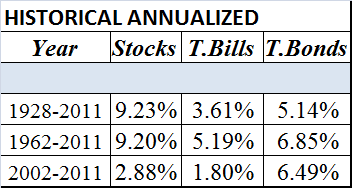Readers regularly ask, “Where to invest?” This article answers some basic investment questions and hones in on the difference between investing in stocks and bonds.
Much investing advice is based on historical returns of cash, stock, and bond investments. That advice is great as long as history repeats itself. Any soothsayers out there? I’ve yet to uncover the person who accurately predicts the future.
Look at these historical returns:

UNPACKING HISTORICAL INVESTMENT RETURNS
From 1928 to 2011, stock, bond and treasury bill (a cash proxy) returns followed the long term expected historical returns. Stocks won with long term annualized returns of 9.23 percent. Coming in second were treasury bonds at 5.14 percent and one year treasury bills long term returns bringing up the rear with 3.61 percent returns. These annualized returns mask the inter-year volatility. Stocks, with their highest annualized returns also had the greatest annual volatility with gains as much as 30 percent in one year and losses of equal amounts in another. Treasury bonds and bills, as their lower returns would predict were less risky with smaller ups and downs in individual years.
What if you started investing in 2002 and used historical data to to project your future returns? You might put a large chunk in stock investments with the assumption that stocks always outperform bonds.
What happened from 2002 to 2011?
Recent investment returns were unusual in that bond returns beat stocks by almost 3%. If you knew in 2002 that bonds would outperform stocks, with less volatility, then of course you would have put all your funds in bonds. But hindsight can’t bring back the past.
What is a Safe Investment?
In investing, safe means less volatility of returns (less risk) and risky means more volatility of returns. Higher risk means a chance of higher returns, not a guarantee of higher returns. Traditionally, since stocks offered higher returns and more volatility, they are considered riskier than bonds. Investors demand higher returns in exchange for investing in riskier assets. I expect this trend to return, but offer no guarantees.
Safety is a tricky issue. In reality every investment has some risk:
- Inflation risk-Risk that your investment will be worth less in the future because of rising inflation.
- Credit risk-Risk that your bond issuer will default and you’ll lose all or part of your investment.
- Market risk-Risk that outside forces (think 911 or a tsunami or European debt crisis) will tank your entire stock portfolio returns.
- Firm specific risk-Risk that the company you invested in has problems and your investment values declines.
Cash and bonds are susceptible to inflation risk. If you get a return of 2.5 percent on your bond or bank CD (certificate of deposit) and inflation is 3 percent. Your investment loses 0.5 percent per year.
If the market falls due to outside reasons, most stock mutual funds and ETFs will decline in price as well.
Keep your cash under the mattress and you’re at risk of theft and certain decline of purchasing power due to inflation.
Are Bonds Safer than Stocks?
Bonds are usually less volatile. So, if you are looking for fewer ups and downs in your portfolio, then bonds are certainly less risky. Recognize that you’re giving up a bit of excess return potential investing in bonds (although not during the last 10 years). If you cannot tolerate any volatility then the absolute best investments are Government I (Inflation) Bonds and Treasury Inflation Protected (TIPS) securities. These bonds are guaranteed to preserve your principal investment from the ravages of inflation. Otherwise, most bonds and bond funds are less volatile than stocks and historically offer lower returns.
What’s an investor to do?
1. If you cannot tolerate any volatility and only want to preserve your capital from inflation, buy I Bonds and Treasury Inflation Protected Securities.
2. If you are quite risk averse and can only tolerate a bit of volatility, tilt your portfolio towards a higher weight in bonds and lower weight in stock investments.
3. For the risk takers out there, increase your stock investments with the expectation that history will prevail and stocks will outperform bonds and cash investments in the long term
THE TAKEWAY
Do not invest any money in stock investments that you need within the next five to ten years.
This is not a recommendation to buy or sell any investments.
Download the free, How to Invest and Outperform Most Active Mutual Fund Managers ($9.99 value).
Asset Allocation is the best recommendation for reducing returns while maintaining competitive returns.
In general bonds are less volatile than stocks.
How much risk do you take in your investments? Are your investments tilted toward stocks or bonds?
